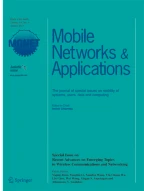Abstract
Distributed contention-based Medium Access Control (MAC) protocols are the fundamental components for IEEE 802.11 type Wireless LANs (WLAN). The deficiency of these types of MAC protocols mainly comes from the idle slots used to contend the channel and from the transmission collisions due to the same backoff slot value being generated. Assigning the same transmission opportunity to various length packets also degrades the system performance. This study takes account of the above issues and presents a new MAC scheme called Maximizing Transmission Time (MTT) to enhance the wireless LAN performance. This scheme allows each station to transmit a burst of packets after winning a transmission opportunity instead of just one packet. This idea can reduce the average number of waiting slots and collision probability in each transmission cycle. Moreover, in order to ensure fairness among stations, a maximum transmission period is assigned to each station for controlling the length of the bursty transmission. An analytical performance model is derived for computing the throughput of the MTT scheme. The extensive simulation experiments reveal that the proposed method can enhance the wireless LANs performance significantly with high throughput, low delay and high degree of fairness.
Similar content being viewed by others
References
N. Abramson, Development of the Alohanet, IEEE Transactions on Information Theory 31 (1985) 119–123.
N. Abramson, Multiple access in wireless digital networks, Proceedings of the IEEE, 82 (1994) 1360–1370.
D. Bertsekas and R. Gallager, Data Networks (Prentice-Hall International, London, 1992).
G. Bianchi, Performance analysis of the IEEE 802.11 distributed coordination function, IEEE Journal on Selected Areas in Communications 18 (2000) 535–547.
F. Cali, M. Conti, and E. Gregori, Dynamic tuning of the IEEE 802.11 protocol to achieve a theoretical throughput limit, IEEE/ACM Transactions on Networking 8 (2000) 785–799.
A. Chandra, V. Gummalla and J.O. Limb, Wireless medium access control protocols, IEEE Communications Surveys, Second Quarter 2000.
IEEE, Wireless LAN medium access control (MAC) and physical layer (PHY) specifications, IEEE Standards, 1999.
L. Kleinrock, Queueing Systems (Wiley-Interscience, New York, 1975) Vol. II.
L. Kleinrock and F. Tobagi, Packet switching in radio channels: Part I—Carrier sense multiple-access modes and their throughput-delay characteristics, IEEE Transactions on Communications 23 (1975) 1400–1416.
C.E. Koksal, H. Kassab and H. Balakrishnan, An analysis of short-term fairness in wireless media access protocols, in: Proceedings ACM SIGMETRICS 2000, Jun 17–21 2000, Santa Clara, CA, 2000.
OPNET Inc., “http://www.opnet.com.”
R. Rom and M. Sidi, Multiple Access Protocol: Performance and Analysis. (Springer-Verlag, New York, 1990).
S. Tasaka, Performance Analysis of Multiple Access Protocols (MIT Press, Cambridge, MA, London, 1986).
F. Tobagi and L. Kleinrock, Packet switching in radio channels: Part II—The hidden terminal problem in carrier sense multiple-access and the busy-tone solution, IEEE Transactions on Communications 23 (1975) 1417–1433.
N.H. Vaidya, P. Bahl and S. Gupta, Distributed fair scheduling in a wireless LAN, 6th Annual International Conference on Mobile Computing and Networking (MOBICOM 2000), Boston, MA, USA, Aug 6–11, 2000.
X.G. Wang, J.E. Mellor and K. Al-Begain, Discrete Event Simulation of the IEEE 802.11 MAC protocol,” Sixth United Kingdom Simulation Society Conference (UKSim2003), Emmanuel College, Cambridge, UK, 2003.
K. Younggoo, F. Yuguang and H. Latchman, A novel MAC protocol with fast collision resolution for wireless LANs, INFOCOM 2003. Twenty-Second Annual Joint Conference of the IEEE Computer and Communications Societies, IEEE, 2003.
Author information
Authors and Affiliations
Corresponding author
Additional information
Xin Gang Wang received his 1st B.Sc. degree in Computer Science from the Heilongjiang University, P.R.China, in 2001. He is currently a Ph.D. student in the computing department, University of Bradford. His research interests include performance modeling of the mobile networks.
Geyong Min received the PhD degree in computing science from the University of Glasgow, United Kingdom, in 2003, and the BSc degree in computer science from Huazhong University of Science and Technology, China, in 1995. He is currently a lecturer in the Department of Computing at the University of Bradford, United Kingdom. His research interests include Performance Modelling/Evaluation, Parallel and Distributed Systems, Mobile Computing, Computer Networks, Multimedia Systems.
Dr. Min is the founding co-chair of the International Workshop on Performance Modelling, Evaluation, and Optimisation of Parallel and Distributed Systems (PMEO-PDS) held in conjunction with IEEE/ACM-IPDPS. He is the guest editor of the journals Computation and Concurrency: Practice and Experience, Future Generation Computer Systems, and Supercomputing. He has served on the program committees of a number of international conferences. He is a member of the IEEE Computer Society.
John Mellor has worked in the modelling and simulation of communication networks for 25 years. Early work included dynamic alternate routing and the application of learning automata to routing strategies in circuit and packet switched networks. Collaboration with a Cambridge UK company led to the development of a LAN protocol which consistently outperformed Ethernet. He was sent as a government expert to study the Manufacturing Messaging protocol in the USA and Japan. He later became a technical expert consultant on the application of European Directives within manufacturing industry. A forray into radio frequency identification tags resulted in the development of a novel protocol that was exploited by a major vehicle component manufacturer. He now finds himself involved in wireless protocols with researchers working on WiFi (802.11) and on security aspects of mobile commerce. John is leader of the Mobile Computing and Networks Resaerch Group at the University of Bradford and course tutor to three innovative advanced MSc. courses in mobile computing, applications and security.
Lin Guan received the B.Sc degree in computer science from Heilongjiang University, Heilongjiang, China, in 2001. She is currently a PhD student in University of Bradford. Her research interests focus on developing cost effective analytical models for the performance evaluation of congestion control algorithms for Internet traffic.
Rights and permissions
About this article
Cite this article
Wang, X.G., Min, G., Mellor, J.E. et al. Maximizing Transmission Time (MTT): A Distributed MAC Scheme for Enhancing Wireless LAN Performance. Mobile Netw Appl 10, 617–625 (2005). https://doi.org/10.1007/s11036-005-3357-8
Issue Date:
DOI: https://doi.org/10.1007/s11036-005-3357-8
